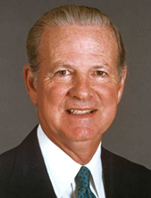Weakened by Conflicts of Interest
16 December 2003, Caroline Rothnie, The Progressive Government Institute
On December 5th President Bush appointed James A. Baker III to the newly created post as envoy of Iraqi debt. According to Bush, "Secretary Baker will report directly to me and will lead an effort to work with the world’s governments at the highest levels, with the international organizations and with the Iraqis in seeking the restructuring and reduction of Iraq’s official debt." Baker was the first President Bush’s secretary of state and had an influential role in the 2000 Florida recount as a Republican election observer. However, Baker brings to the post connections that reach far beyond his close relationship with the Bush family. As a partner in the law firm Baker Botts and a senior counselor to the Carlyle Group, a global investment company, Baker has many lucrative ties to the Middle East.
The Carlyle Group owns United Defense, a Virginia-based contractor that makes weapons delivery systems and combat vehicles. Carlyle filed to take United Defense public less than a month after U.S. troops began bombing Afghanistan. As the 11th largest defense contractor in the U.S., Carlyle has much to gain from the war on terror, and with high-profile political figures on its board such as Baker, George Bush Sr., and Reagan defense secretary Frank Carlucci, maintains a unique ability to influence this country’s military progress.
When planes crashed into the World Trade Center and the Pentagon on September 11, 2001, Baker, along with the rest of the Carlyle board, was in Washington D.C. having an annual meeting with some important investors: the bin Laden family. The family, which claims to have severed all ties with Osama bin Laden, invested $2 million in the Carlyle Partners II fund. As recently as 2000, Bush Sr. is said to have traveled to Saudi Arabia on behalf of the family. In October 2001, Carlyle terminated its relationship with the bin Ladens in response to the controversy the investments drew.
Baker’s law firm, Baker Botts, has numerous ties to Saudi Arabia. Members of the firm defended Prince Sultan bin Abdul Aziz, Saudi Arabia’s minister of defense, in a $1 trillion dollar law suit seeking damages for victims of September 11th [5]. Robert Jordan, another founding member of Baker Botts, is now ambassador to Saudi Arabia. Baker Botts has also been involved in assisting American oil companies in the Caspian Region, including negotiating with the Taliban before September 11th about laying pipeline in Afghanistan.
Baker Botts also represents Halliburton, the largest contractor in Iraq. Halliburton, headed by Dick Cheney until he became vice-president, has recently been accused of overcharging the U.S. government for its work in Iraq.
While none of these connections necessarily suggest any wrongdoing on the part of Baker, Baker Botts, or Carlyle, they represent a powerful conflict of interest for Baker as he serves in Iraq.
With both Baker and Bush Sr. working for Carlyle, the group has an unprecedented influence on the White House. Shortly after taking office, the second president Bush broke off talks with North Korea about long-range ballistic missiles, shocking South Korea, which had spent years negotiating with North Korea, aided by the Clinton administration. In June of that year, at the urging of his father, Bush reopened negotiations. Carlyle’s significant interests in South Korea may have colored the elder Bush’s. advice. Carlyle had recently bought out a bank and telecommunications company in South Korea, and stood to profit from a stable relationship between North and South Korea.
Peter Eisner, managing director of the Center for Public Integrity, says of the Carlyle Group’s ties to business and politics: "It should be a deep cause for concern that a closely held company like Carlyle can simultaneously have directors and advisers that are doing business and making money and also advising the president of the United States. The problem comes when private business and public policy blend together. What hat is former president Bush wearing when he tells Crown Prince Abdullah not to worry about US policy in the Middle East? What hat does he use when he deals with South Korea, and causes policy changes there? Or when James Baker helps argue the presidential election in the younger Bush's favor? It's a kitchen-cabinet situation, and the informality involved is precisely a mark of Carlyle's success."
Baker will not be reimbursed for his appointment in Iraq, but Carlyle partners hold stakes in the worth up to $180 million each. To avoid the appearance of impropriety, Baker has agreed to forego his portion of any money Baker Botts earns from clients that may present a conflict of interests, but his involvement in the firm and with the Carlyle group is still cause for concern. A recent editorial in the New York Times stated, "Businesses like Carlyle and Baker Botts make their living by flaunting their connections to the politically powerful. To perform honorably in his new public job, Mr. Baker must give up these two private ones."






